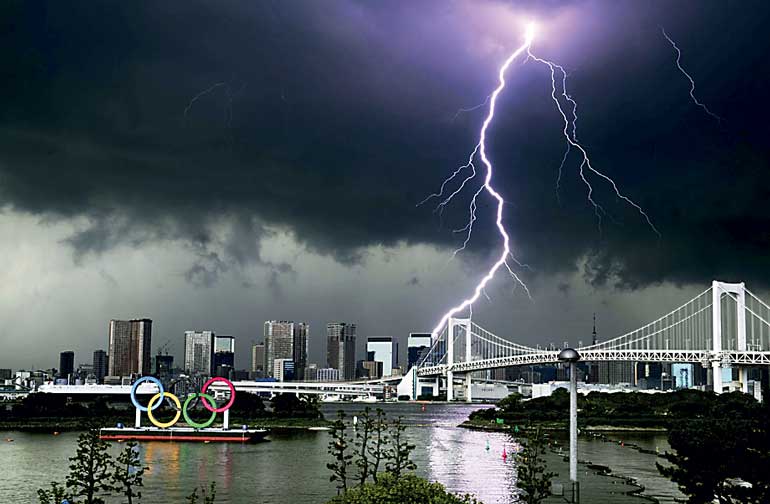Monday Feb 23, 2026
Monday Feb 23, 2026
Tuesday, 13 July 2021 02:33 - - {{hitsCtrl.values.hits}}

A streak of lightening is seen over the giant Olympic rings and the Rainbow Bridge from the waterfront area of Odaiba Marine Park, ahead of the opening of the 2020 Tokyo Olympic Games, that have been postponed to 2021 due to the coronavirus disease (COVID-19) outbreak, in Tokyo, Japan – Reuters
TOKYO (Reuters): Olympic host city Tokyo entered a fresh state of emergency on Monday, less than two weeks before the Games begin amid worries whether the measures can stem a rise in COVID-19 cases.
Organisers last week announced that spectators would be banned from nearly all venues, all but depriving of Japan of hopes for Games with public spectacle.
Spectators from abroad had been banned months ago, and officials are now asking residents to watch on TV.
“We would ask people to support athletes from home,” Chief Cabinet Secretary Katsunobu Kato said on a Sunday TV programme.
The Games, postponed from last year because of the pandemic, run from 23 July to August July 8, while the state of emergency – the capital’s fourth – lasts until 22 August, shortly before the Paralympics begin.
The Government and organisers had long seen the event as a chance to display the country’s recovery from a devastating 2011 earthquake and nuclear crisis.
On Saturday, the governor of Fukushima prefecture, site of the nuclear disaster, said spectators would also be banned from softball and baseball games there, reversing an earlier decision.
World No. 1 tennis player Novak Djokovic said on Sunday he was “50-50” about competing at the Tokyo Olympics following the organisers’ decision to ban fans from attending and limits on the number of people he can take to the Games.
Some of the sport’s biggest names, including Rafa Nadal, Dominic Thiem, Stan Wawrinka, Nick Kyrgios, Serena Williams and Simona Halep have already announced decisions to skip the Games.
Japan has not seen the explosive coronavirus outbreak seen elsewhere but has recorded more than 815,440 cases and nearly 15,000 deaths.
Recent rises in Tokyo have been particularly worrisome amid a vaccination rollout that got off to a slow start and has faced supply glitches after speeding up. Only about 28% of the population has received at least one shot of a COVID-19 vaccine.
Tokyo recorded 614 new cases on Sunday, the 22nd straight day of week-on-week gains, and many areas were crowded with shoppers.
The coronavirus curbs include asking restaurants to close early and stop serving alcohol in exchange for a Government subsidy, measures that have hit the eateries hard and caused many to complain of unfairness as the Games are set to go ahead.